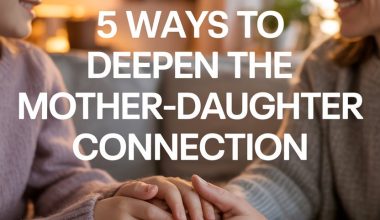Ah, parenthood: that wild rollercoaster where you sometimes wonder if you’re an inspiring life guide or just a snack-dispensing taxi who occasionally yells about socks.
If you’ve ever laid awake replaying your day and tallying your wins versus your “oopsies,” you’re in good company.
The years blur by faster than a toddler in a puddle, but when I look back, there are bright spots—choices, big and small, that make me think, “Well, at least I got that bit right.”
Here’s what I’d do all over again, in case you fancy some tried-and-true ideas to tuck under your belt (next to the biscuit crumbs).
Showing Up, Even When I’d Rather Hide Under a Blanket
The magic wasn’t in the perfect birthday cakes or elaborate holidays, but in being there—really there.
Not just in the “I’m nodding while scrolling my phone” sense, but in the “I’m listening with both ears, even though my to-do list is giving me side-eye” kind of way.
I cheered at every lopsided painting. Attended football matches where rain was falling sideways. Listened to endless tales about dragons, Minecraft, and why baked beans are superior to peas.
Some of those moments felt ordinary or even inconvenient at the time. Now, I’d trade my best pair of shoes to have them back.
If your child invites you into their world, even if it’s just to watch a snail cross the path, accept the invitation. The snail might be slow, but these moments are fleeting.
Treating Their Worries Like They Mattered (Because They Did)
To us, a missing sock or a “friendship drama” might seem minor, but to a child, their worries are mountainous. I learned, usually after a few stumbles, to take their feelings seriously.
When they said, “I’m scared the monster will get me,” I didn’t brush it off. I got down at eye level, asked questions, handed out hugs, and sometimes constructed elaborate anti-monster rituals involving lavender spray and motivational pep talks.
Research from the University of Cambridge suggests that validating a child’s feelings strengthens emotional intelligence and resilience [link: https://www.cam.ac.uk/research/news/emotional-intelligence-in-children-strengthened-by-parental-validation].
Turns out, all those nights spent monster-hunting were doing more than saving us from imaginary danger—they were building trust.
Sticking to Bedtime Stories (Even When I Was Cross-Eyed with Sleep)
Books were our nightly bridge—a gentle way to reconnect after days that sometimes looked like a blend of chaos and crumbs. Rituals, like reading together, help kids feel safe and loved, even if the plot involves talking underpants.
A study in Pediatrics showed that regular bedtime reading boosts language development, emotional connection, and even future academic outcomes [link: https://pediatrics.aappublications.org/content/134/1/e29].
Bonus: It’s a lovely excuse to cuddle, and you might rediscover your love of dragons and silly voices.
Laughing Together—Especially at the Messy Bits
Nothing beats a shared giggle over a pancake disaster or a toothpaste mural. Laughter helped us through tantrums, teenage angst, and those days where everything seemed to go pear-shaped.
Humour isn’t just for the highlight reel; it’s a powerful parenting tool. According to The Journal of Family Psychology, families who laugh together report stronger bonds and better stress management [link: https://psycnet.apa.org/record/2013-08230-001].
And frankly, when your child glues a raisin to the cat, you can either cry or laugh (the cat will do both).
Apologising When I Messed Up
I’ve snapped, overreacted, and once accused an innocent party of eating the last biscuit (it was me, in fact). Each time, I tried to own up, apologise sincerely, and model how to make amends.
It turns out that parents who own their mistakes raise kids who are more forgiving and self-aware, according to researchers at the University of Washington [link: https://www.washington.edu/news/2018/04/09/forgiving-mistakes-helps-kids-grow/].
Apologising doesn’t shrink your authority; it shows your humanity.
Saying “No” (and Sticking to It, Even Through Sulking)
For every “yes” to treats or extra screen time, there’s a pile of “no, you can’t eat cake for breakfast” or “no, you may not turn the living room into your science lab.”
Boundaries might make you the villain of the household (cue Oscar-worthy sulking), but children crave the safety of limits.
Studies show that kids with clear, consistent boundaries feel more secure and are less likely to push back in risky ways [link: https://www.psychologytoday.com/gb/basics/parenting/child-discipline].
They might not thank you at the time, but future-you won’t regret sticking to your guns when it comes to what truly matters.
Letting Them Be Bored (Even When It Drove Me Bonkers)
There’s a special kind of parental guilt reserved for hearing, “I’m boooored.” My first instinct? Leap into action with crafts, activities, or—on my weaker days—YouTube.
Yet, when I resisted the urge to schedule every minute, they invented games, built forts, and turned cardboard boxes into spaceships.
Psychologists have found that unstructured time is essential for fostering creativity and problem-solving skills in children [link: https://www.childmind.org/article/why-kids-need-boredom/].
Next time you hear the B word, take a breath, hand them a cardboard tube, and see what magic unfolds.
Celebrating Their Weirdness
One child wanted to wear odd socks for an entire year. Another spent months speaking in pirate slang. I cheered from the sidelines (and occasionally wore an eyepatch of my own).
Embracing their quirks meant they felt safe to be themselves, warts and all.
Experts from Harvard say children who feel accepted for who they are have higher self-esteem and better mental health outcomes [link: https://www.gse.harvard.edu/news/uk/17/03/raising-kids-who-feel-accepted].
Yes, your kitchen may briefly become a pirate ship, but the sense of belonging lasts much longer than the phase.
Prioritising Time Over Stuff
The toy bins were always overflowing, and yet my kids’ favourite memories rarely involved anything with a battery or assembly instructions. What they craved most? My time and attention.
Even short bursts—ten minutes playing cards, a walk to the shop, or sharing a snack—meant more than a van full of new gadgets.
Research from the University of Illinois highlights that shared experiences matter far more to children than material gifts [link: https://news.illinois.edu/view/6367/837799].
The best presents, it turns out, can’t be wrapped up (unless you count wrapping yourself in a blanket fort).
Trusting My Gut (Even When Google Disagreed)
Online advice is a mixed bag—one minute, you’re told to feed your child kale smoothies, the next, someone’s suggesting raw milk and goat yoga. With every new parenting debate, I tried to filter out the noise and trust my own instincts.
Mother’s intuition isn’t just folklore; research shows that tuning in to your own judgment, especially after learning the basics, leads to better outcomes for your child [link: https://www.psychologicalscience.org/news/releases/new-moms-should-trust-their-gut.html].
No one knows your child quite like you do (not even the expert with the large glasses and impressive bookshelf).
Leaving Perfection at the Door
Pinterest boards, Instagram feeds, and the school mum who somehow always wears white without a single jam stain: forget it. Kids don’t need a perfect parent—they need a real one.
I gave myself permission to be “good enough,” and that’s when parenting felt lighter.
Donald Winnicott, a British paediatrician, coined the phrase “good enough mother” to reassure us all: striving for perfection is neither necessary nor possible [link: https://www.psychologytoday.com/gb/blog/the-good-enough-parent/201903/what-does-good-enough-parent-mean].
Turns out, being ordinary—sometimes silly, sometimes tired, always loving—is the very best thing you can be.
Bringing It Back to the Small Stuff
Every family is a patchwork of wins and blunders.
If you’re reading this, there’s a good chance you’re already doing more right than you realise (even if today’s highlight was not losing your cool when someone smeared banana on the telly).
Regret sneaks in when we imagine we’re supposed to be superhuman. Reality? Being there, loving hard, and trying again tomorrow is more than enough.
Every bedtime story, every kitchen disco, every apology—those are the things that build a childhood worth remembering.
And if you’re wondering what your kids will recall years from now, odds are it’ll be the way you looked at them when they did something marvellous (or slightly mad), the way you laughed with—never at—them, and how you showed up, messy and marvellous, every single day.
Now, go ahead—hug your little oddball, pour yourself a cuppa, and take pride in the best bits. No regrets needed.




